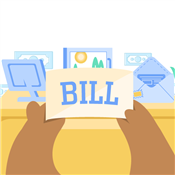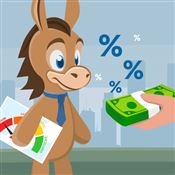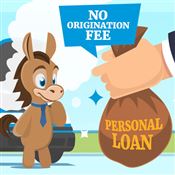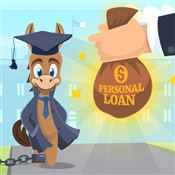Personal Loan Calculator
Applying for a personal loan? Calculate monthly payments and interest rate before working with lenders - plus, find out how loans affect your credit.
 |
If you need money in a pinch, a personal loan could be worth looking into. But don't sign onto a loan without knowing you can commit to the payments.
With this calculator, you'll know exactly…
- How much your monthly loan payment will be
- How many months you'll be paying off your loan
- How much you'll pay in total, including interest
Find out how your personal loan is calculated and tips for choosing a good loan with the guide below.
How to Calculate a Personal Loan
 |
Here's how to calculate your loan repayment:
- Enter the loan amount that you want to borrow.
- Enter interest rate that the lender will charge on the loan.
- Enter term (years) that you'll be paying back the loan.
Once you hit "Calculate", you'll see your loan repayment mapped out with different graphs. Make sure you can commit to the payments each month. Otherwise, you risk loan default.
The last table uses an amortization schedule to further break down your payments. It shows you how much of your monthly payment is paid on the principal and how much is paid on interest.
With a lower interest rate, you pay less overall. This is because more of your monthly payment goes toward principal instead of interest.
Once you understand your loan repayment, continue on to learn how personal loans fit into your finances.
Personal Loan Basics
 |
Most personal loans work the same way. You'll make monthly payments over the course of a few years to pay off the principal and interest. Find out if a personal loan is right for you with the FAQs below.
What can I use a personal loan for?
People often use personal loans to refinance or consolidate credit card debt, pay for home or car repairs, and cover emergency expenses.
You can get approved for a personal loan quickly, so it's common for people to use it as an alternative to an emergency fund. However, we don't recommend this since it can get you further into debt.
What is a good interest rate on a personal loan?
A good interest rate for a personal loan will be lower than the national average, which is currently 12%.
Your credit score, debt-to-income ratio, and employment status help lenders decide what interest rates to offer you. The loan amount and repayment terms also influence the interest rate. Bigger loans with longer terms usually come with higher interest.
How much can you borrow on a personal loan?
Personal loan amounts range from $1,000 to $100,000. However, it's more common to see lenders offer between $3,000 and $50,000.
Smaller lenders, credit union or bank, won't be able to lend as a larger institution could.
Do personal loans hurt credit?
Applying for a loan will usually drop your score by a few points. This is because the lender pulls a "hard inquiry" on your credit. The drop should only last a few months to 1 year. The inquiry will be on your credit report for a while longer, about 2 years.
Other than that, a personal loan should not hurt your credit as long as you make all your payments on time.
Secured personal loans have lower interest rates than unsecured loans. This is because an unsecured loan doesn't require collateral which helps hold borrowers accountable.
There are other types of loans that are "cheaper" than personal loans, such as federal student loans. However, these loans work differently than personal loans and can't be used for the same things.
Types of Personal Loans
Most personal loans are unsecured. But a lender may offer you a different type of loan if you have poor credit.
Unsecured: These loans don't require collateral. Most borrowers with a good credit score can qualify for an unsecured loan.
Secured: This loan requires you to put up collateral that matches the value of the loan, like a car.
Borrowers with poor credit may only qualify for a secured loan. If you can't make your payments, the lender can seize the collateral until the loan is paid.
Co-signed: This is another loan option for borrowers with bad credit. Another person, usually with better credit, signs onto the loan with you.
If you can't make your payments, your co-signer is liable to pay them.
Variable Rate: The interest rate on these loans fluctuates based on different indexes and benchmarks. This also causes your payments to fluctuate.
Variable rates are better for loans with shorter terms because there's less of a chance that rates will surge.
After you figure out what kind of personal loan you're looking for, the following tips will help you find the loan that's right for you.
How to Choose the Best Personal Loan
 |
Don't rely on guesswork to choose which loan is best for you. Take these steps to secure a personal loan that won't break the bank.
- Use a calculator!
Don't rely on guesswork when shopping around for a loan.Adjust the interest rate and terms on the calculator above to see what you're comfortable with paying. This tells you what to aim for when you start looking into lenders.
- Gather rates and terms from several lenders.
Many banks and credit unions can instantly "pre-qualify" you for a loan online.They'll propose an APR, repayment period, and monthly installments. This gives you the chance to think it over before they make a hard inquiry on your credit.
- Pick a low APR and higher installments.
Personal loan APRs usually range from 9% to 30%. A lower APR is best, but it will mean your monthly payments are higher.Choose a loan with the lowest APR you can find, and the highest installments that you're comfortable with. This avoids overpaying on interest so you can pay off the loan sooner.
Bottom Line
If you need a decent sum of money quickly, you might apply for a personal loan from a bank, credit union, or an online lender.
Before applying, be sure to do your research and confirm that you'll be able to make the payments. If possible, try to pull from an emergency fund or savings instead to avoid going further into debt.
Additional Resources
Holly Zorbas is a assistant editor at CreditDonkey, a credit card comparison and reviews website. Write to Holly Zorbas at holly.zorbas@creditdonkey.com. Follow us on Twitter and Facebook for our latest posts.
|
|
|








